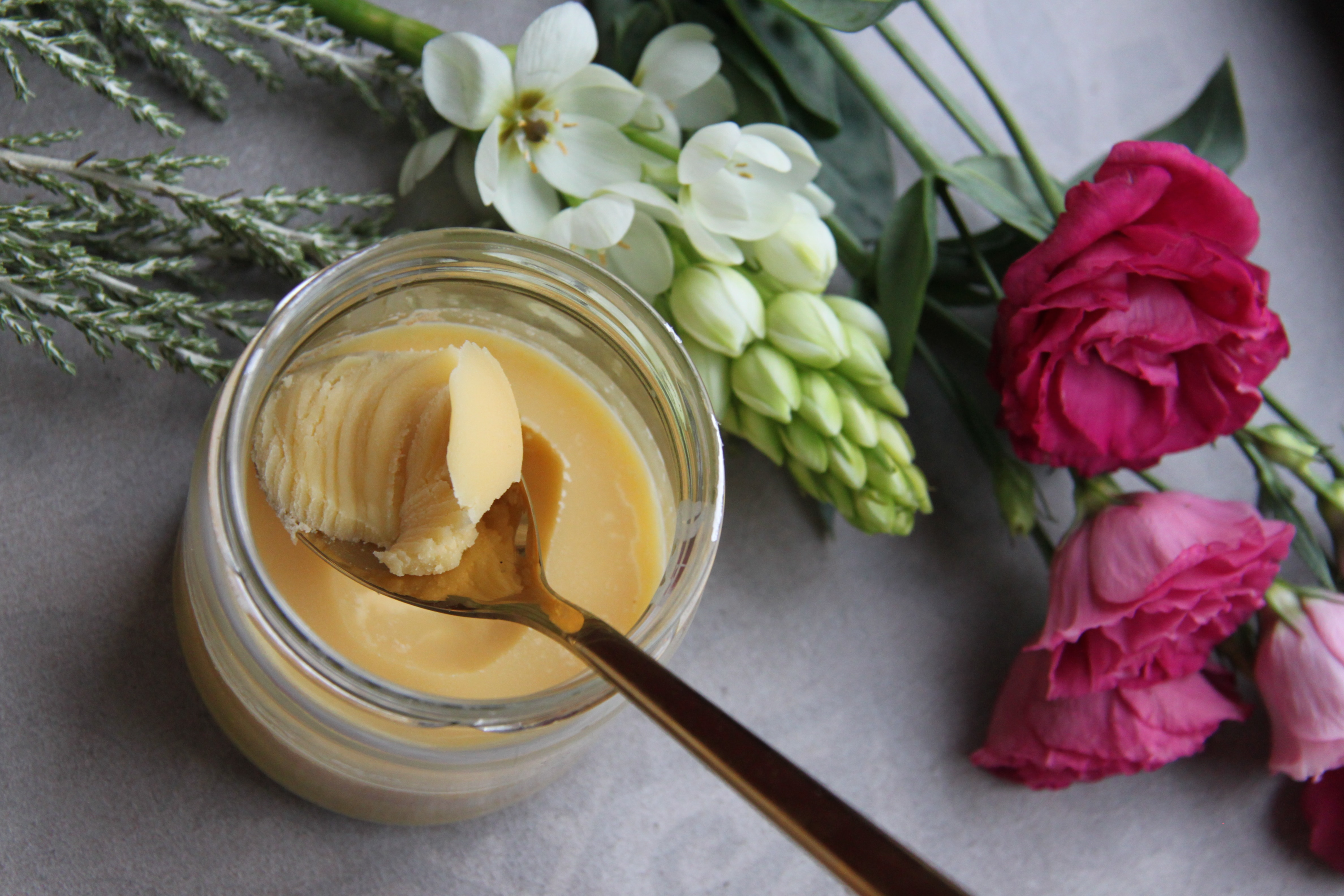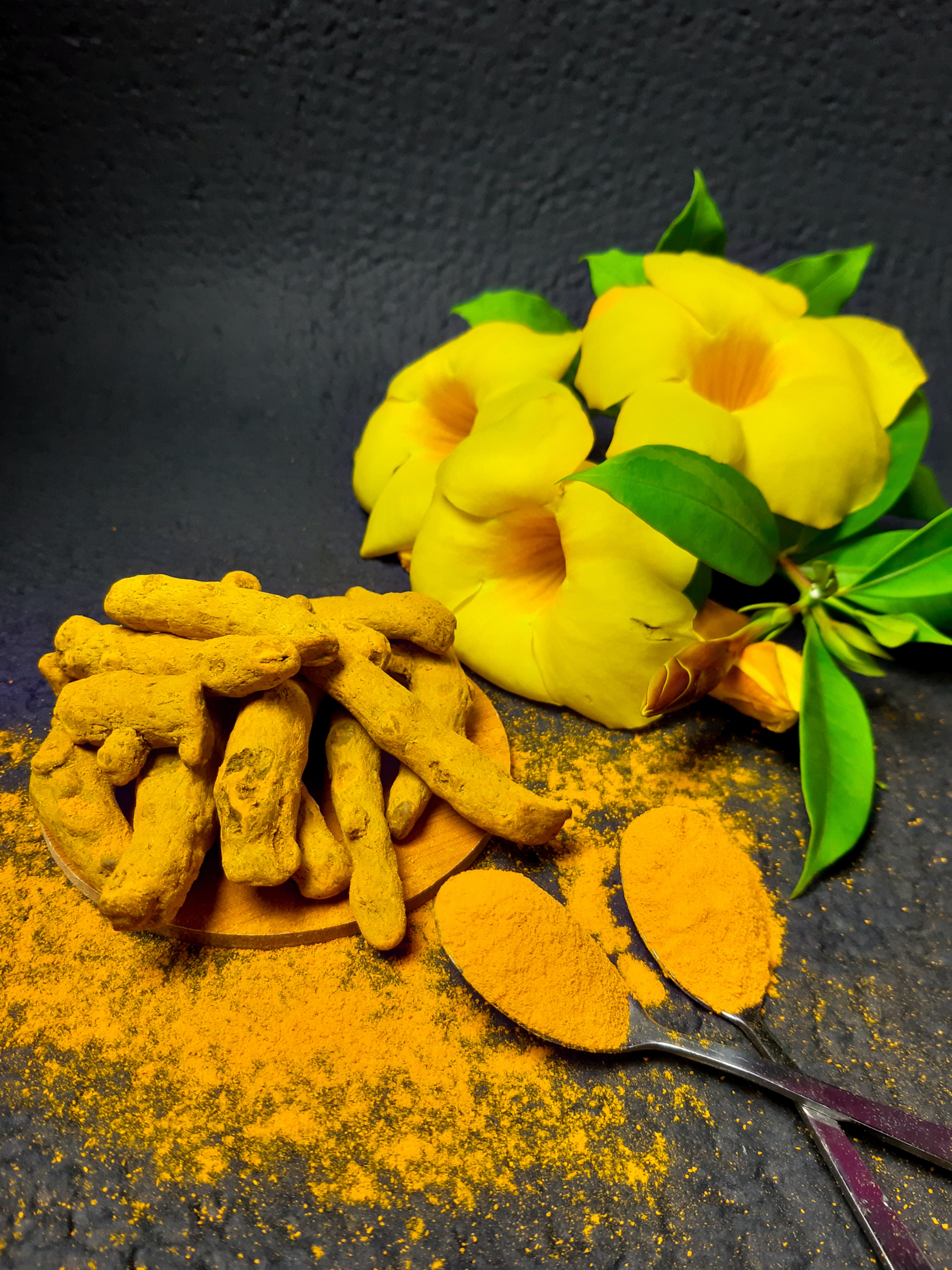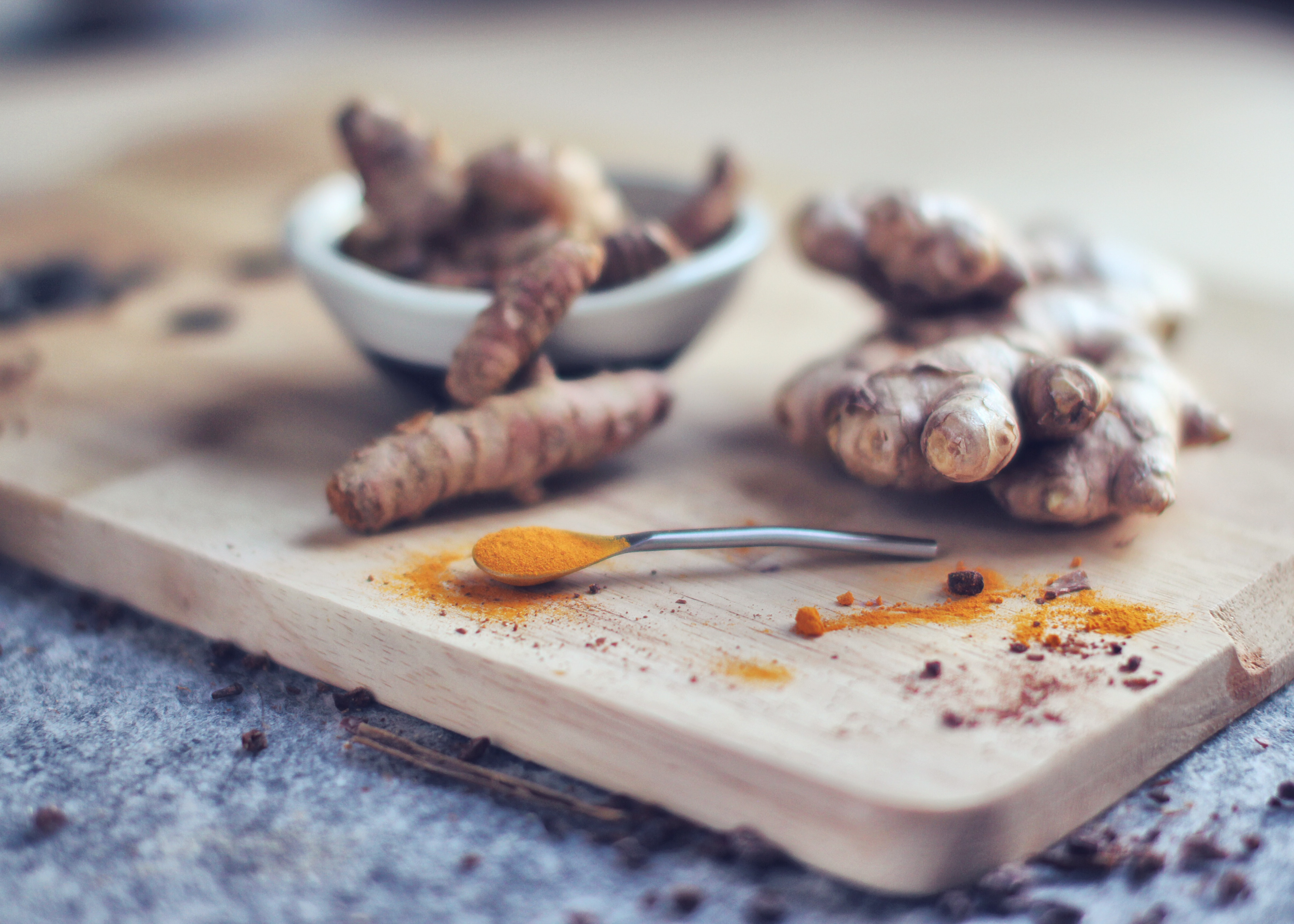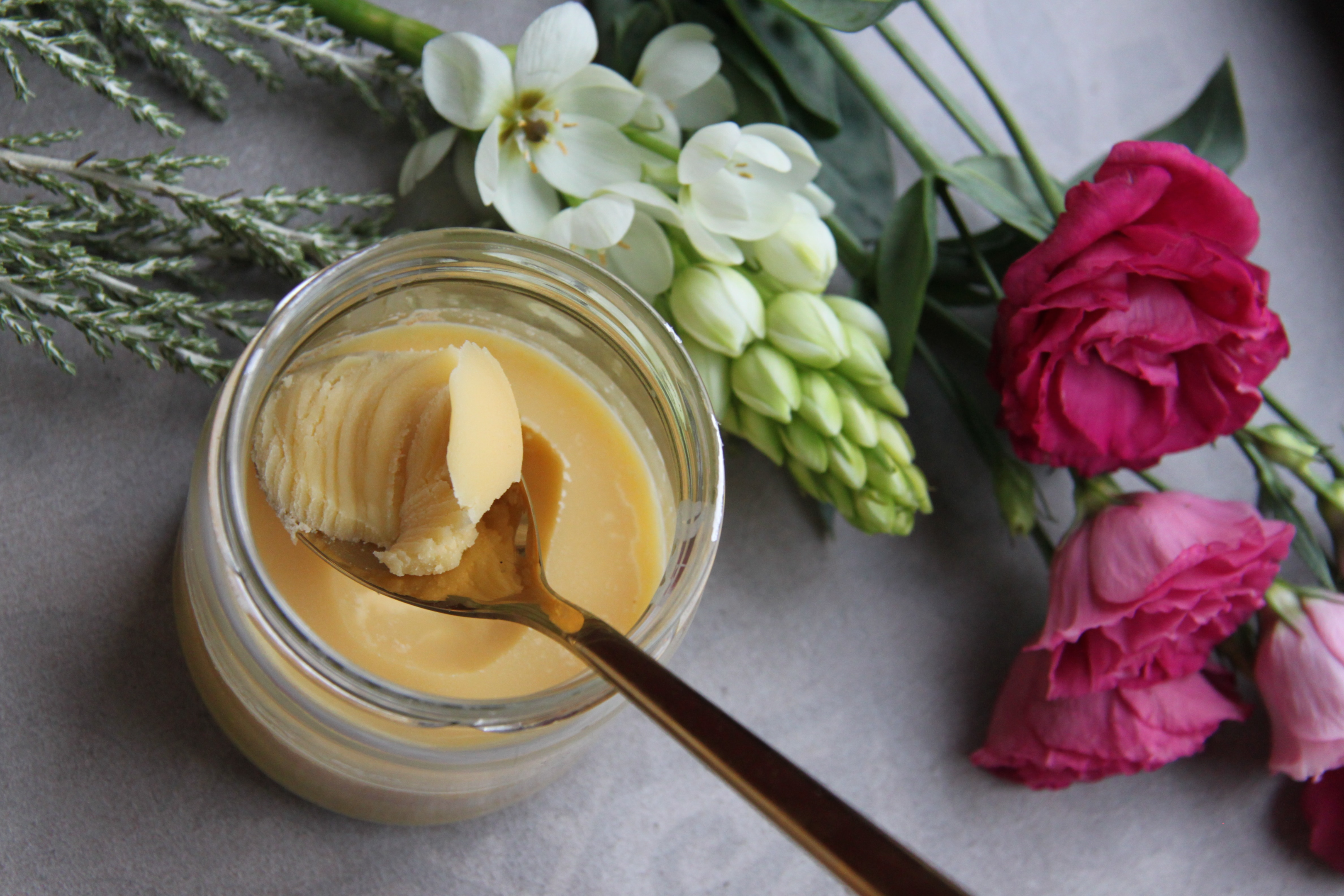

Any lifestyle magazine worth its weight talks about the importance of getting your diet right, for good skin, while you nourish your skin with the right products-right essential oils; moisturizers, serums, and face masks. This article is your fix for everything you need to know about superfoods that find mentioned in Ayurveda for not just good skin but overall vitality, health, and wellness.
Ayurvedic superfoods refer to a group of nutrient-dense foods that have been used in Ayurvedic medicine for centuries to promote optimal health and well-being. These foods are considered to be superfoods because they are packed with vitamins, minerals, antioxidants, and other beneficial compounds that support the body's natural healing processes. Some of the most commonly used Ayurvedic superfoods include turmeric, ginger, ashwagandha, ghee raw honey, and triphala.

Turmeric contains a powerful anti-inflammatory compound called curcumin, which has been shown to reduce inflammation in the body and help alleviate symptoms of chronic diseases such as arthritis, heart disease, and diabetes. Curcumin has also been found to have anti-cancer properties, making it a promising natural treatment option for certain types of cancer. Additionally, turmeric has been shown to improve brain function and reduce the risk of cognitive decline by increasing levels of a growth hormone called brain-derived neurotrophic factor (BDNF).
Turmeric also has antioxidant properties, which can help protect the body and skin from damage caused by free radicals and oxidative stress. It also has antimicrobial properties, making it effective against certain bacteria and viruses. Turmeric is easy to incorporate into your diet by adding it to dishes like curry meals, soups, and smoothies, or by taking supplements. Overall, turmeric is one of the most versatile and powerful superfoods with numerous health benefits that make it a valuable addition to any diet.
One of the most significant benefits of turmeric for the skin is its ability to reduce inflammation with curcumin in it. Inflammation is a leading cause of skin issues such as acne, rosacea, and eczema. By reducing inflammation, turmeric can help to calm irritated skin and reduce redness, making it an excellent option for those with sensitive skin. Turmeric is also known for its ability to fight acne. Acne is often caused by bacteria, and turmeric has antibacterial properties that can help to prevent the growth of acne-causing bacteria. Turmeric also helps to unclog pores and reduce excess oil production, which are both factors that contribute to acne formation. In addition to its acne-fighting properties, turmeric can also brighten the skin. Turmeric contains antioxidants that can help to reduce the appearance of dark spots and hyperpigmentation, leaving the skin looking brighter and more even. Turmeric also has exfoliating properties, which can help to remove dead skin cells and reveal brighter, healthier-looking skin.

Ginger is another anti-inflammatory spice that is commonly used in Ayurvedic medicine to aid digestion and reduce nausea. Ginger is a root that has been used for centuries for its medicinal and culinary properties. Superfoods like ginger are packed with nutrients and bioactive compounds that have numerous health benefits. The main active compound in ginger is gingerol, which has anti-inflammatory and antioxidant effects. Ginger has been shown to reduce inflammation in the body, which can help alleviate pain and prevent chronic diseases like cancer, heart disease, and diabetes. Ginger also reduces nausea and bloating, making it a great remedy for those who suffer from digestive problems.
Ginger has been found to have anti-cancer properties as well. Scientific evidence shows that ginger can inhibit the growth of cancer cells and prevent them from spreading to other parts of the body. Additionally, ginger has been shown to boost the immune system, which can help prevent illnesses and infections.
Ginger is also a great source of vitamins and minerals, including magnesium, potassium, and vitamin B6. These nutrients are essential for maintaining good health and preventing chronic diseases. Ginger has also been found to improve brain function, memory, and reaction time, making eating it a great addition to any diet.
In addition to its health benefits, ginger is also a versatile ingredient in cooking. It can be used in sweet and savory dishes, with spices and its unique flavor adds depth and complexity to any recipe. Ginger tea, as an herbal tea, is also a popular beverage that can be enjoyed hot or cold, and is a great way to reap the benefits of ginger, when had with raw honey.
Ginger has anti-inflammatory and antioxidant properties that make it an excellent ingredient for skin care products. It is rich in gingerol, a compound that helps to improve blood circulation, which in turn helps to nourish the skin and give it a healthy glow. Ginger also contains a high concentration of antioxidants, which help to protect the skin from free radical damage and prevent premature aging.
One of the most significant benefits of ginger for the skin is its ability to reduce inflammation. Inflammation is a common cause of many skin problems, including acne, eczema, and psoriasis. Ginger contains compounds that help to reduce inflammation and redness, which can lead to clearer, more radiant skin. Additionally, ginger has antiseptic properties that help to prevent infections and promote healing.
Ginger also helps to improve skin elasticity and tone. It contains antioxidants that help to protect the skin from environmental stressors that can cause damage and aging. Ginger also helps to stimulate collagen production, which is essential for maintaining youthful-looking skin. Collagen is a protein that gives skin its elasticity and firmness, and as we age, our bodies produce less of it. Using ginger in skin care products can help to boost collagen production, which can lead to firmer, more supple skin.

Ashwagandha is an adaptogenic herb and one of the superfoods that helps the body respond to stress and improve immune function; and this helps lower stress-related conditions like blood sugar and hypertension. Ashwagandha, also known as Indian ginseng, is a powerful herb that has been used for centuries in Ayurvedic medicine to promote health and longevity. Ashwagandha is one of the superfoods known for its numerous benefits that can help with various health issues. One of the main benefits of ashwagandha is its ability to reduce stress and anxiety. It contains compounds that have been shown to reduce cortisol levels, which is the hormone responsible for stress. Ashwagandha has also been shown to improve brain function, memory, and focus, making it an excellent supplement for students or anyone looking to improve their cognitive abilities.
Another benefit of ashwagandha is its ability to boost the immune system, making it an excellent supplement to take during cold and flu season. It contains compounds that have been shown to increase white blood cell production, which helps to fight off infections and diseases. Ashwagandha is also known for its anti-inflammatory properties, which can help with conditions such as arthritis, asthma, and other inflammatory diseases.
In addition to its physical benefits, ashwagandha has also been shown to improve mood and overall well being. It contains compounds that have been shown to increase the production of serotonin, which is the hormone responsible for feelings of happiness and well being. This makes ashwagandha an excellent supplement for those struggling with depression or other mood disorders.
Finally, ashwagandha has been shown to improve sexual function in both men and women. It can help to increase libido, improve fertility, and reduce symptoms of menopause in women. This makes it an excellent supplement for those looking to improve their sexual health and overall well being.
This ancient herb is known for its numerous health benefits, including its potential to improve skin health. Ashwagandha benefits for skin are wide-ranging and include anti-aging effects, improved immunity, skin hydration, and reduced inflammation.
One of the most significant benefits of ashwagandha for the skin is its anti-aging effects. Ashwagandha contains high levels of antioxidants, which help to protect the skin from damage caused by free radicals. Free radicals are unstable molecules that can damage skin cells and cause premature aging. Antioxidants help to neutralize these molecules and prevent them from causing harm to the skin. Additionally, ashwagandha contains compounds called withanolides, which have been shown to stimulate the production of collagen. Collagen is a protein that gives skin its structure, elasticity, and firmness. As we age, our bodies produce less collagen, which can result in wrinkles and sagging skin. By boosting collagen production, ashwagandha can help to reduce the signs of aging and promote more youthful-looking skin.
Another benefit of ashwagandha for the skin is improved hydration. Ashwagandha contains compounds called glycowithanolides, which have been shown to stimulate the production of hyaluronic acid. Hyaluronic acid is a substance that occurs naturally in the body and is responsible for keeping skin hydrated and plump. By increasing the production of hyaluronic acid, ashwagandha can help to improve skin hydration and reduce the appearance of dry, flaky skin.
Ashwagandha has powerful anti-inflammatory properties that can benefit the skin. Inflammation is a natural response of the body to injury or infection, but chronic inflammation can lead to a range of health problems, including skin issues such as acne, eczema, and psoriasis. Ashwagandha contains compounds that can help to reduce inflammation in the body, which can result in clearer, healthier-looking skin.

Ghee, which is clarified butter, is a rich source of healthy fats that can help improve digestion and support brain health. A type of clarified butter, ghee is made by simmering butter and removing the milk solids, leaving behind pure and nutrient-rich oil. Ghee is one of the most coveted superfoods because of its numerous health benefits and one of the main benefits of ghee is that it is a rich source of healthy fats. Unlike other types of fats, ghee is high in medium-chain fatty acids (MCFAs), which are easily metabolized by the body and converted into energy. This makes ghee an excellent source of energy for athletes and people who lead an active lifestyle. Additionally, ghee is also rich in conjugated linoleic acid (CLA), which has been shown to have anti-cancer properties and help reduce inflammation in the body.
Ghee is also an excellent source of vitamins and minerals. It is particularly high in vitamin A, which is essential for maintaining healthy vision, skin, and immune function. Ghee is also a good source of vitamin K2, which is important for bone health and preventing arterial calcification. In addition, ghee contains trace amounts of other vitamins and minerals such as vitamin E, vitamin D, and selenium.
Another benefit of ghee is that it is lactose-free and casein-free, making it an ideal choice for people who are lactose intolerant or have a dairy allergy. Ghee is also shelf-stable and has a longer shelf life than regular butter, making it a convenient option for cooking and baking.
In Ayurvedic medicine, ghee has been used for its healing properties for thousands of years along with other spices like black pepper, turmeric, ginger, garlic, and cinnamon, among others. It is believed to help improve digestion, boost the immune system, and promote overall health and well being. Ghee is also used in Ayurvedic massage and as a natural remedy for a variety of ailments such as constipation, insomnia, and joint pain.
Ghee, which you need a spoonful of daily in your meals, is rich in vitamins A, D, E, and K, which are all essential nutrients for maintaining healthy skin. One of the most significant benefits of ghee for skin is its moisturizing properties. It deeply nourishes and hydrates the skin, making it soft and supple. Ghee is also an excellent source of antioxidants, which help to fight against free radicals and prevent premature aging. Regular use of ghee on the skin can reduce the appearance of wrinkles, fine lines, and age spots.
Ghee also has anti-inflammatory properties that can help to soothe and calm irritated skin. It is particularly beneficial for people with dry, itchy skin or conditions such as eczema and psoriasis. Ghee's high-fat content creates a protective barrier on the skin, which helps to retain moisture and prevent further irritation. Additionally, ghee contains butyric acid, a fatty acid that has antimicrobial properties. This makes it effective in treating acne and other skin infections.
Another benefit of ghee for the skin is its ability to improve skin tone and texture. Regular use of ghee can help to reduce hyperpigmentation and even out skin tone. It also helps to improve skin elasticity and firmness, giving the skin a youthful glow. Ghee can be used as a natural skin cleanser, helping to remove dirt and impurities from the skin without stripping away its natural oils.
Triphala is one of the traditional superfoods in ayurveda that has been used for centuries in India to promote overall health and wellness. Like the now-popular berries such as goji berries or mulberries, this potent blend of three fruits - amla (Indian gooseberry), haritaki, and bibhitaki (all three are superfoods in their own right too)- is known for its numerous health benefits including its ability to support digestion and detoxification. The combination of these superfoods help to stimulate the digestive system, increase bowel movements, and eliminate toxins and waste from the body. This can lead to improved energy levels, clearer skin, and overall better health.
In addition to its digestive benefits in ayurveda, triphala is one of the superfoods loaded with antioxidants. The amla fruit is among the superfoods that are rich in vitamin C, which helps to protect the body from free radical damage and boost the immune system. This makes triphala an excellent choice for anyone looking to improve their overall health and reduce the risk of chronic diseases such as cancer, heart disease, blood sugar or diabetes.
Triphala, rich in vitamin c, also has anti-inflammatory properties, which can help to reduce inflammation throughout the body. This can be particularly beneficial for those suffering from conditions such as arthritis or inflammatory bowel disease. By reducing inflammation, triphala can help to alleviate pain and discomfort and improve overall quality of life.
Finally, triphala is also known for its ability to promote healthy eyesight due to the presence of vitamin c. The amla fruit, in particular, is rich in antioxidants and other nutrients that can help to protect the eyes from damage and promote healthy vision. This makes triphala an excellent choice for anyone looking to support eye health and prevent age-related vision loss.
Triphala, which is a blend of three fruits, is a potent antioxidant that can help support healthy digestion and promote overall health and well being.
Triphala has incredible anti-aging properties. Triphala contains antioxidants that help to neutralize free radicals, which can cause damage to the skin. This helps to prevent the signs of aging such as wrinkles, fine lines, and age spots.
Triphala has impressive anti-inflammatory properties among all the superfoods, according to Ayurveda, which can help to reduce inflammation in the skin. This can be particularly beneficial for those with sensitive skin or those who suffer from skin conditions such as eczema or psoriasis.
Triphala is also loved as one of the superfoods for the skin for its ability to improve skin tone and texture. Triphala helps to stimulate collagen production, which can help to improve skin elasticity and firmness. This can help to reduce the appearance of fine lines and wrinkles and give the skin a more youthful appearance.
In addition to its anti-aging and skin-toning properties, Triphala, among the many superfoods, also has a cleansing effect on the skin. It helps to remove dirt and impurities from the skin, which can help to prevent breakouts and acne. This superfood is also known for its ability to balance the pH of the skin, which can help to prevent dryness and other skin problems.






